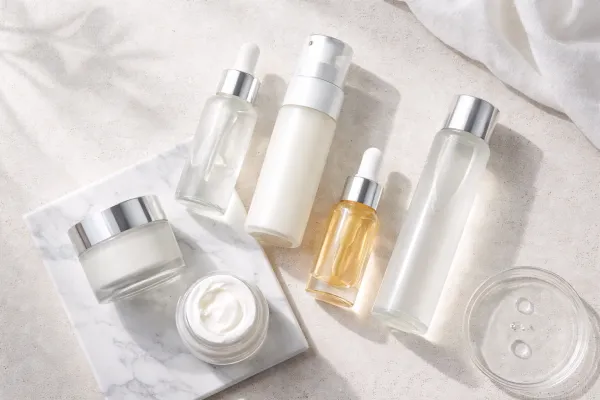Does Exfoliating Too Much Cause Acne? Understanding the Risks and Remedies
Explore how over-exfoliation can lead to acne and learn effective remedies to maintain healthy skin.

Exfoliating is a popular skincare practice that helps remove dead skin cells and can improve the look of your skin.
However, many people wonder if doing it too often can lead to problems like acne. In this article, we will explore the risks of over-exfoliation and how to manage your skincare routine to keep your skin healthy and clear.
Key Takeaways
- Exfoliating helps remove dead skin cells and brightens the skin.
- Over-exfoliating can cause irritation, redness, and even more breakouts.
- It's best to exfoliate 1-3 times a week depending on your skin type.
- Using gentle products is key to avoiding skin damage.
- If you notice signs of over-exfoliation, take a break and let your skin heal.
What Is Exfoliation and Why Do We Do It?

Exfoliation is the process of clearing away dead skin cells and impurities through either a chemical ingredient or textured scrub or tool (physical).
We all want that fresh, glowing skin, right?
Exfoliating helps us achieve that by removing the old, dull skin and revealing the new skin underneath.
Benefits of Exfoliation
- Smoother skin texture: Regular exfoliation can make our skin feel softer and look more even.
- Brighter complexion: By getting rid of dead skin cells, we can help our skin look more radiant.
- Better absorption of products: When we exfoliate, our skin can soak up moisturizers and serums more effectively.
Types of Exfoliants: Physical vs. Chemical
Type | Description | Best For |
|---|---|---|
Physical | Scrubs or tools that manually slough off dead skin. | All skin types, but be gentle! |
Chemical | Uses acids like glycolic or salicylic acid to dissolve dead skin cells. | Oily or acne-prone skin. |
How Often Should You Exfoliate?
- Oily Skin: 2-3 times a week.
- Dry Skin: 1-2 times a week.
- Sensitive Skin: Once a week.
Remember, moderation is key! Too much exfoliation can lead to irritation and damage our skin barrier. Let’s keep it balanced!
Signs You're Over-Exfoliating Your Skin
Common Symptoms of Over-Exfoliation
When we think about exfoliating, we often picture smooth, glowing skin.
But too much of a good thing can backfire! Here are some signs that we might be overdoing it:
- Irritation: If our skin feels itchy or raw, it’s a clear sign we need to ease up.
- Redness: Persistent redness can indicate that our skin is inflamed.
- Dryness: Over-exfoliation can strip our skin of its natural moisture, leading to flakiness.
How to Differentiate Between Breakouts and Over-Exfoliation
Sometimes, it can be tricky to tell if we’re dealing with breakouts or the effects of over-exfoliation.
Here’s how we can figure it out:
- Look for patterns: If breakouts appear after a new exfoliating product, it might be time to cut back.
- Check for sensitivity: If our skin reacts badly to other products, it’s likely over-exfoliated.
- Monitor texture: If our skin feels tight and waxy, it’s a sign we’ve gone too far.
Long-Term Effects of Over-Exfoliating
Over time, over-exfoliating can lead to some serious issues:
- Damaged skin barrier: This can make our skin more sensitive and prone to irritation.
- Increased breakouts: Ironically, too much exfoliation can lead to more pimples.
- Premature aging: Stripping away too many layers can speed up the aging process.
Remember, moderation is key! We should aim to exfoliate about 1-2 times a week, depending on our skin type. Let’s keep our skin happy and healthy!
Does Exfoliating Too Much Cause Acne?

Understanding the Connection Between Exfoliation and Acne
When we think about exfoliation, we often picture smooth, glowing skin.
However, an excess of something beneficial can have negative consequences!
Over-exfoliating can actually lead to breakouts. This happens because our skin barrier gets damaged, making it more sensitive and prone to irritation. If we’re not careful, we might end up with more acne instead of less.
How Over-Exfoliation Can Lead to Breakouts
So, how does this happen? Here are some signs that we might be overdoing it:
- Redness and irritation: If our skin feels sore or looks inflamed, it’s a clear sign we need to ease up.
- Dryness and flakiness: Stripping away too many layers can leave our skin parched.
- Increased breakouts: Ironically, trying to clear our skin can lead to more pimples if we’re too aggressive.
Expert Opinions on Exfoliation and Acne
Experts agree that moderation is key. Most of us should aim to exfoliate about 1-2 times a week. Here’s a quick table to help us remember:
Skin Type | Recommended Frequency |
|---|---|
Oily | 2-3 times a week |
Dry | Once a week |
Sensitive | Every 10-14 days |
Remember, listening to our skin is crucial! If it’s feeling irritated, it’s time to take a break from those scrubs and peels. Let’s keep our skin happy and healthy!
How to Recover from Over-Exfoliation

When we realize we’ve over-exfoliated our skin, it’s time to hit the brakes and give our skin some TLC.
Taking care of our skin is super important!
Here’s how we can help it recover:
Immediate Steps to Take
- Stop exfoliating: This is the first and most crucial step. Let’s give our skin a break until it heals.
- Switch to a gentle cleanser: Avoid foaming cleansers and opt for something mild and fragrance-free.
- Moisturize: Hydration is key! Look for products with soothing ingredients like aloe vera or oatmeal to calm irritation.
Best Products for Healing Over-Exfoliated Skin
Product Type | Recommended Ingredients |
|---|---|
Moisturizers | Aloe Vera, Chamomile, Oatmeal |
Soothing Creams | Hydrocortisone, Emollients |
Gentle Cleansers | Fragrance-Free, Non-Foaming |
When to Seek Professional Help
If our skin doesn’t start to improve after a week or two, it might be time to consult a dermatologist. They can provide tailored advice and treatments to help us get back on track.
Remember, our skin needs time to heal. "Leave your skin alone. It will heal all by itself, but it needs time and proper care," says Dr. Gupta.
By following these steps, we can help our skin recover and get back to its glowing self!
Preventing Over-Exfoliation

When it comes to keeping our skin happy, finding the right balance in exfoliation is key.
Here’s how we can prevent over-exfoliation and keep our skin glowing:
Creating a Balanced Exfoliation Routine
- Know Your Skin Type: Understanding whether we have oily, dry, or sensitive skin helps us choose the right exfoliation frequency. For instance, oily skin might handle more frequent exfoliation, while sensitive skin needs a gentler approach.
- Limit Exfoliation Frequency: We should aim to exfoliate no more than two to three times a week. This gives our skin time to heal and regenerate between sessions.
- Choose Gentle Exfoliants: Opt for exfoliants that suit our skin type. Avoid using multiple exfoliating products at the same time to prevent irritation.
Choosing the Right Exfoliants for Your Skin Type
Skin Type | Recommended Exfoliation Frequency |
|---|---|
Oily | 2-3 times a week |
Dry | 1-2 times a week |
Sensitive | Once a week |
Tips for Maintaining Healthy Skin
- Listen to Your Skin: If we notice any signs of irritation, like redness or peeling, it’s time to take a break and let our skin recover.
- Moisturize After Exfoliating: Always follow up with a good moisturizer to restore hydration and protect our skin.
- Use Sunscreen: Protecting our skin from UV damage is crucial, especially after exfoliating.
Remember, taking care of our skin is a journey, not a race. Let’s be gentle and patient with ourselves!
Alternative Remedies for Acne-Prone Skin
When it comes to dealing with acne, we all want to find the best solutions that work for us. Here are some alternative remedies that can help keep our skin clear and happy!
Gentle Cleansing Techniques
- Use a mild cleanser: Look for something that won’t strip our skin of its natural oils.
- Avoid harsh scrubs: They can irritate our skin and make things worse.
- Wash twice daily: Keeping our skin clean is key to preventing breakouts.
Effective Spot Treatments
- Benzoyl Peroxide: This helps kill bacteria and reduce inflammation.
- Salicylic Acid: Great for unclogging pores and keeping skin clear.
- Tea Tree Oil: A natural alternative that can be effective for some.
Natural Remedies to Soothe Acne
- Aloe Vera Gel: This can soothe the skin and reduce inflammation. Just apply it directly from the plant!
- Honey Mask: Honey has natural antibacterial properties. Apply it as a mask for about 15 minutes.
- Green Tea: Brew some green tea, let it cool, and apply it to your face with a cotton ball. It’s soothing and packed with antioxidants.
Remember, everyone’s skin is different, and what works for one person might not work for another. It’s all about finding what suits us best!
Expert Tips for Healthy, Glowing Skin

Daily Skincare Essentials
Taking care of our skin daily is super important! Here are some essentials we should all include in our routine:
- Cleanser: A gentle cleanser helps remove dirt and oil without stripping our skin.
- Moisturizer: Keeping our skin hydrated is key. Look for one that suits your skin type.
- Sunscreen: Always apply SPF daily to protect against sun damage.
Importance of Hydration and Diet
Staying hydrated and eating well can really boost our skin’s health. Here’s what we can do:
- Drink plenty of water to keep our skin plump.
- Eat colorful fruits and veggies for vitamins and antioxidants.
- Limit sugary snacks and processed foods to avoid breakouts.
Lifestyle Changes for Better Skin
Making small changes in our daily lives can lead to big improvements in our skin:
- Get enough sleep: Aim for 7-9 hours a night to help our skin repair.
- Manage stress: Try yoga or meditation to keep stress levels down.
- Exercise regularly: It boosts circulation and helps our skin glow.
Remember, taking care of our skin is a journey, not a race! Let’s be patient and consistent with our routine to see the best results.
Wrapping It Up: Exfoliation and Acne
So, here’s the deal: exfoliating is super important for keeping our skin fresh and clear, but too much of it can actually backfire and cause breakouts.
If you’re scrubbing your face every day, you might be doing more harm than good. It’s all about finding that sweet spot! Aim to exfoliate just a couple of times a week and pay attention to how your skin reacts. If it starts to feel red or irritated, it’s time to ease up.
Remember, healthy skin is happy skin, so listen to your body and adjust your routine as needed. Keep it simple, and your skin will thank you!




